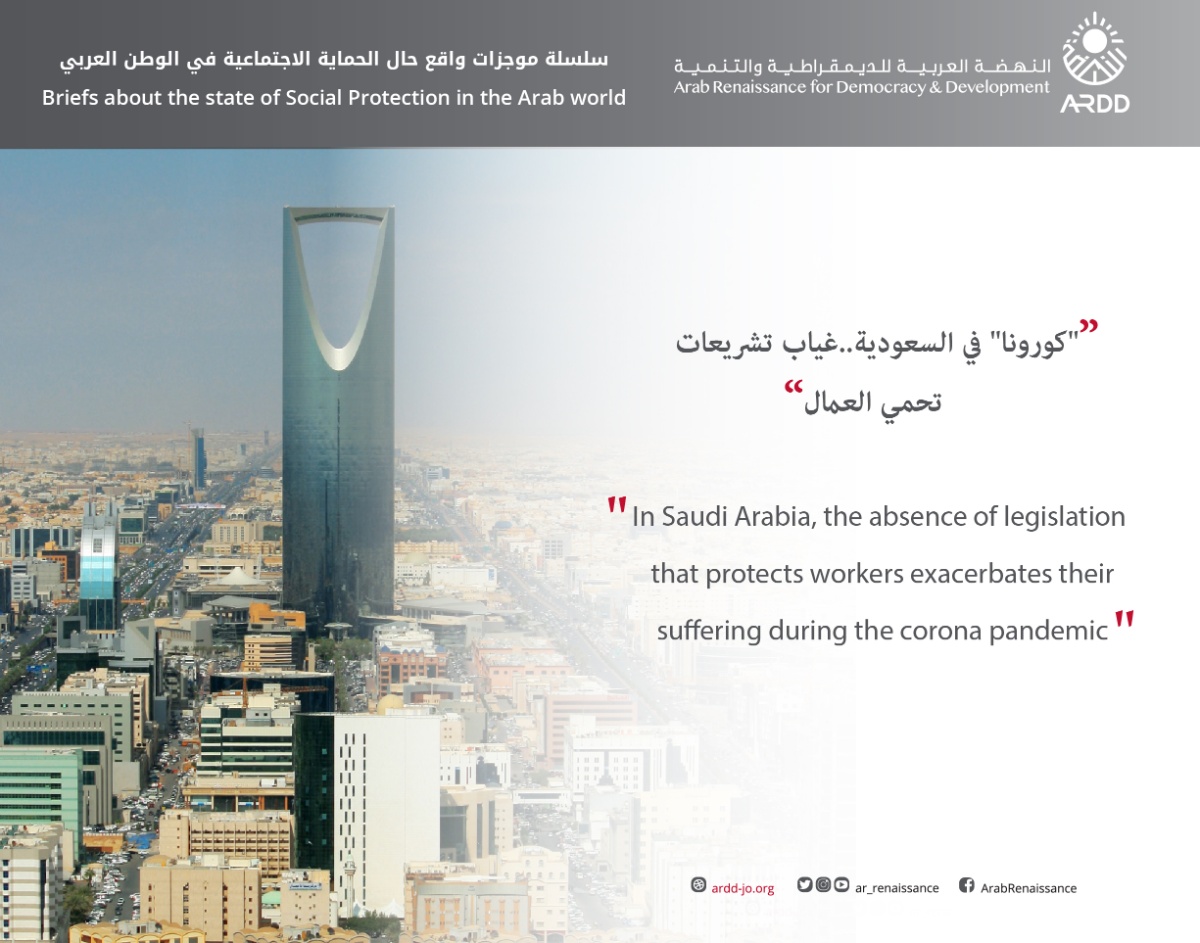Saudi Arabia is not fighting a virus for the first time now; in 2012, it had to deal with MERS, another strain of coronavirus that killed hundreds of people.
This time around, the new coronavirus did not catch the Kingdom unprepared. It had separate units allocated for respiratory diseases, equipped with special ventilation for better protection of medical workers, as well as great medical expertise1.
The virus was first detected in Al Qatif city, east of Saudi Arabia. By the end of March 2020, Riyadh had the highest number of cases, at 36.72%, followed by Mecca 32.69%, and the Eastern Province 20.02%2.
The Arab Renaissance for Democracy and Development (ARDD), which has been carrying out a series of research about the reality of social protection in the Arab world, presents Saudi Arabia’s general measures and responses towards the corona pandemic, as well as the measures it took to protect vulnerable groups, such as the poor, the elderly, children, migrants, refugees and people with disabilities.
Saudi Arabia took preventive measures to avoid an economic crisis, having allocated 50 billion Saudi riyals ($13 billion) to support small- and medium-sized businesses, at the same time exempting them from paying interest on long-term loans3.
The widespread of corona is threatening women workers in the private sector, which is expected to hire much fewer women. Schools and childcare facilities have been closed since the beginning of March 2020, therefore, housework and family responsibilities will automatically fall on women, increasing the amount of challenges they already face4.
When it comes to the protection of guest workers, Saudi Arabia is exerting all efforts to protect its citizens only, ignoring these guest workers who now face increased challenges; most of them have lost their jobs for good, and around 700 workers were forced to take unpaid leaves for three months5.
Guest workers in Riyadh are in a terrible situation due to the labor law that gives employers wide authority over guest workers. This leads to employers abusing and exploiting them. Guest workers from Yemen, Sudan, Egypt, and Asia are affected most by the crisis due to their deteriorating economic situation, on account of the economic and health crisis, and of Riyadh requiring them to pay their fees, regardless of the case, which only increases their suffering5.
Saudi Arabia has been facing wide global criticism for illegally deporting around 500,000 Ethiopian workers, fearing the spread of the coronavirus6.
Hundreds of prisoners were released; most had been arrested for criminal activities or for residing illegally in the kingdom. At the same time, demands to release “political prisoners” are increasing due to the real threat to their lives in light of the deteriorating health conditions in prisons7.
Supporting government efforts to stem the consequences of the coronavirus, around 300 civil society organizations rushed to help, spreading information about the preventive measures required and supporting communities in health matters related to the crisis8.
With the spread of the coronavirus in Saudi Arabia, demands for legislation protecting the rights of guest workers are growing because they enjoy no rights and are deprived of their essential needs.
[1] Experience helps Saudi Arabia and Kuwait quickly contain corona
[2] Saudi Arabia and corona: Focusing on public health rather than internal politics
[3] Because of corona… Saudi Arabia allocates an economic package to support businesses
[4]The effects of coronavirus pandemic on Saudi women
[7]Saudi Arabia releases hundreds of prisoners after the spread of corona
[8]General/an awareness campaign to limit the ramifications of corona


